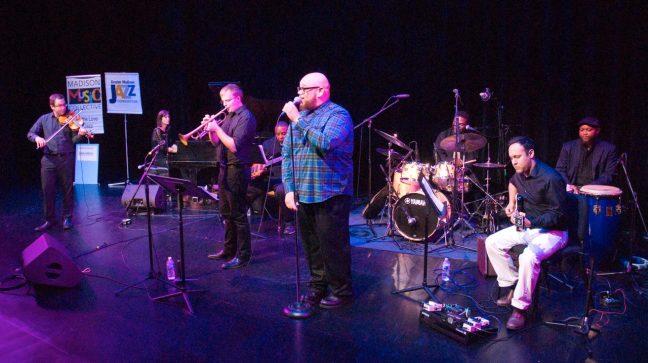The Rick Flowers Septet performed the first concert of the InDIGenous Jazz Series Friday night at Madison’s Memorial Union Play Circle.
Jazz is integrated into the Madison community and at the University of Wisconsin. UW teaches jazz studies as part of its music curriculum. Matthew Endres, an adjunct professor of jazz percussion and jazz history at UW, feels passionate about his teaching.
Endres teaches two jazz history classes, one in the fall and one in the spring. He also teaches the undergraduate drum set majors private studio lessons.
When students leave the jazz studies program, Endres said he is confident they will be able to play anything because the program focuses on all genres and emphasizes improvisation. That was apparent in Friday’s concert when the group swung to their own beat for parts of the songs.
The jazz concert caught the attention of the Madison community, and the concert was viewed by an almost-full theater.
Jazz was definitely the forefront of the show, but more specifically, the group played Latin American guitar-inspired jazz. They dressed in all black, but Flowers sported a black and tan striped tie while the performing guitarist Richard Hildner upped his outfit with white pants.

The Septet featured Rick Flowers on the drums and piano, Bruce Alford on the electric bass, “Brother Edi” Gbordzi on percussion, Becca Grant on piano, Paul Dietrich on trumpet, Michael Gieron on violin, Richard Hildner on guitar and Rob “Dz” Franklin as a guest vocal artist.
The concert was co-presented with the Wisconsin Union Directorate Music Committee, Great Madison Jazz Consortium and Madison Music Collective. Franklin introduced the show and said it would be a night of “grooves,” “jazz” and “freedom.”
During the first song, Gieron took the spotlight. The jumpy and upbeat tune ended with a loud applause from the audience. The next song featured both Gieron and Dietrich, who took separate solos while the rest of the Septet jammed to a softer tune in the back.
“Brother Edi” soon set a Latin American beat, and another solo was played by Gieron. The Septet jammed so hard Flowers dropped one of his drumsticks. The group lost no passion for their song and continued playing with the same energy.
Halfway through the song Flowers and Gbordzi shared a solo, while the rest of the Septet kept the beat. The two wowed the audience who gave another loud applause.
The tone of the music then switched to a slow jazz, where Flowers played with a drum brush instead of drumsticks. Throughout the show, the Septet varied their beat and tone but stuck with the main style of Latin American jazz.
During the show, Flowers remarked how proud he was of all the musicians. He credited his musical inspiration to Charles Brown, Ray Charles and his dad — who are just a few of his many inspirations. Flowers started out playing the saxophone, but his dad encouraged him to try the drums.
“My favorite part is just getting to create,” Flowers said.
Flowers spoke on the spiritual meaning of music to him and said he knows there is a God because of music. Flowers also enjoys playing with a pianist for an accompaniment.
While Flowers remarked on his enjoyment of the piano, he couldn’t help himself but play, jumping into a tune. Soon Gieron was playing with him, and Flowers started singing in a beautiful accompaniment.

“A lot of people refuse to see the strife that’s in one’s life,” Flowers sang.
Although jazz may put some people in the blues, the Rick Flowers Septet kept their energy throughout the show. The night was filled with applause, and as Franklin predicted, “grooves,” “jazz” and “freedom.”
Those sentiments were echoed by UW student and band member Bailey Holtz, who said he always plays with energy.
“Music is absolutely everything to me,” Holtz said. “Music has taught me that there is almost a song for every mood you’re feeling, and a good song can break you out of a bad mood. Learning guitar allowed me to come out of my box, be more open in front of a crowd and put my mood into music.”
Holtz plays the mellophone — an instrument similar to the french horn, in the UW marching band. He also plays the guitar in his free time.
Holtz recognized not many students in the marching band are music majors. He said people can still perform even if music isn’t their calling.
“Everyone can be as musical as they want, and music is the best cure for any mood,” Holtz said.


